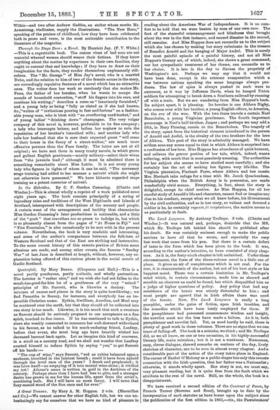A Great Treason. By Mary A. M. Hoppus. 2 vole.
(Macmillan and Co.)—We cannot answer for other English folk, but we can un- hesitatingly say for ourselves that we have no kind of pleasure in
reading about the American War of Independence. It is no com- fort to be told that we were beaten by men of our own race. The fact of the shameful mismanagement and blindness that brought about the war in the first instance, and caused disaster in the second, still remains. And Miss Hoppus does not reconcile us to the subject which she has chosen by making her story culminate in the treason
of Benedict Arnold and the hanging of Major Andrei. This is surely the most painful episode of a painful history, and not all Min Hoppus's literary art, of which, indeed, she shows a great command, nor her sympathetic treatment of her theme, can reconoile us to her choice. It is late in the day to discuss the propriety of Washington's act. Perhaps we may say that it would not have been done, except in the extreme exasperation which a war between nations speaking the same language always pro- duces. The law of spies is always pushed in such wars to extremes, as it was by Jefferson Davis, when he hanged Union soldiers for attempting to break down a Southern railroad by running off with a train. But we are wandering from Miss Hoppus's book. Its subject apart, it is 'pleasing. Its heroine is one Althea Digby, who comes over with her brother, a young English officer, to America, on the eve of the war. With the two there travels a certain Noel Branxholm, a young Virginian gentleman. The fourth important personage is Noel's half-brother, Jasper ; and perhaps we may add a fifth, in Mary Fleming, cousin to the Branxholms. The tragedy of the story, apart from the historical element introduced in the person of Arnold and Andr6, is the rivalry of the two brothers for the love of Althasa. This part of the story is admirably managed. We have seldom seen any scene equal to that in which Althma is surprised into a confession of her love. Miss Hoppus has abundance of quiet humour, and relieves the graver portion of her tale, which, indeed, wants relieving, with much that is most genuinely amusing. The authorities for her subject she seems to have studied most carefully; and she certainly has the art of making her figures very life-like. The Virginia plantation, Flatbush Farm, where Althma and her cousin Mrs. Mavinoh take refuge for a time with Mr. Jacob Quackenbose, Philadelphia when the British Army is in possession, are made wonderfully vivid scenes. Everything, in fact, about the story is delightful, except its chief motive. As Miss Hoppus, for all her careful study of Arnold's life and character, cannot find or imagine any clue to his conduct, except what we all knew before, his ill-treatment by the civil authorities, and as in her story, so valiant and devoted a soldier is he, he certainly repents fit turpissi;nus, the motive seems to us particularly at fault.










































 Previous page
Previous page